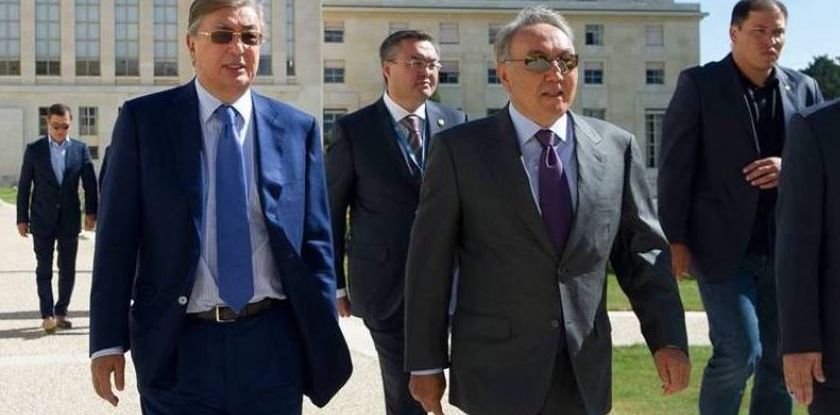One of the key problems of the upcoming power transition in Kazakhstan is Nursultan Nazarbayev himself. Wishing to preserve his power and the existing order of things in the country (including the political system and practices), he is constantly trying to modernize the economy and the people. At that, he is not trying to change himself and his main working tool – the state.
For this reason, Nazarbayev’s years-long attempts to make the country, its economy, and citizens successful and able to meet competition are often described in the words of the former Russian prime-minister Victor Chernomyrdin, “We wished our best, you know the rest”.
Here is how we have arrived at this conclusion.
First, in the 21st century, this kind of task cannot be completed by the means of the state apparatus alone. Business and society must not simply show their support but actively, even self-sacrificingly, participate in the process. In Kazakhstan, however, the business is subordinate to Akorda and the state vertical. And this subordination has been definitively sealed after the failure of the Democratic Choice of Kazakhstan movement – an attempt on the part of the business to defend its interests.
The same is true for the society. Akorda’s desire to preserve the political stability in the country by any means possible has led to the following. First, the citizens’ political activity got seriously limited, second, the social activity has started to fade as well. As a result, we have what we have – the total social passivity. And neither the quasi-social organizations not the authorities’ calls for productive work and active participation in implementing Nazarbayev’s orders cannot change the situation.
Second, Akorda and the ruling elite are trying to solve two strategic tasks simultaneously – to preserve their power and to carry out the modernization of the economy and the social conscience (in other words, the people). These tasks are, a priory, at odds with each other. Consequently, the state apparatus, being the only instrument for their implementation, must operate in the two opposite directions.
We have no knowledge whether Nursultan Nazarbayev and his closest allies understand this. However, the feeling that the country is not simply going around in circles but, since the world is constantly moving forward, is falling behind more and more is growing in the Kazakhstan society. Hence the strengthening of the emigration mood and the increase of the emigration.
The problem is that there is little chance Akorda and the ruling elite will attempt some serious reforms – no matter who the leader of the country is, Nursultan Nazarbayev or his successor(s). In either event, Kazakhstan needs a serious internal or external push to start the cardinal reforms. For the USSR, it was the severe and systemic economic problems of the 80s when the falling oil prices and the Afghan war expenditures destroyed the existing economic mechanism making its preservation essentially non-feasible.
For Kazakhstan, the push may come as yet another decrease of the oil prices but only if the prices for the Kazakh oil drop to $20-25 per barrel (twice below the current rate). Then, perhaps, Akorda will face the necessity to change something in the country and in itself. Although, thanks to the National Fund, the Kazakhstan authorities will be granted several years of postponement – but that’s the extent of it.
We do not share the opinion that the existing order in Kazakhstan may be changed by the radical Islamists’ activities or by the massive civic marches for the civil freedoms and rights. Yes, they may shake the country, however, as the experience tells us, Akorda has perfected its ability to fight them. Moreover, it is ready to do so.
Besides, the Kazakhstan authorities will be guaranteed the Russian support. Russia already has the experience of fighting the armed separatists in the North Caucasus. The Syrian case has demonstrated that Russia can handle such incidents even in a faraway region. So, it is understood that it will be able to handle them in the neighboring Kazakhstan.
Kazakhstan also shares borders with China that experiences serious problems with extremists in the Xinjiang-Uyghur autonomous region. For this reason alone, China will support the Kazakhstan authorities and, consequently, will not oppose Russia’s bringing the troops to the Kazakh territory and fighting for Nazarbayev or his successors.
Therefore, the current political “stability” in Kazakhstan based on the stable oil prices, the toughness of the state vertical, the consolidation of the ruling elite, its unwillingness to scarifies its self-interests, and the desire of the neighboring countries to preserve the status-quo, will continue to exist for a relatively long time. Note that this “stability” has nothing to do with people’s respect for the president or the loyalty of his allies.
Thus, we can project that, for years to come, Kazakhstan is to follow the internal political paths of Russia and China with allowance for the size of the economies, the quality of the ruling elite and its ability not only to secure the political stability but to modernize, develop the economy.
At that, since they have the necessity to survive during the power transition in Kazakhstan, Nazarbayev’s closest allies and the ruling elite will pay more attention to their own power-preservation than to modernizing the economy in the nearest future. And this is quite logical: from where they stand, the first is so much more important than the second.
Read also: The Main Problem of The Transition, On the transit of power and importance of discussion.




